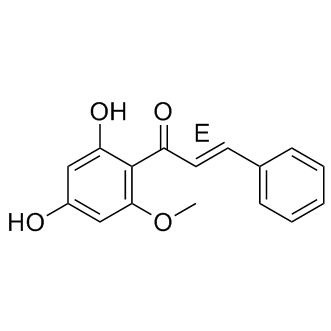All AbMole products are for research use only, cannot be used for human consumption.

In vitro: (E)-Cardamonin selectively blocksTRPA1 activation (IC50=454 nM) while does not interact with TRPV1 nor TRPV4 channel. Docking analysis of (E)-Cardamonin demonstrates a compatible interaction with A-967079-binding site of TRPA1. (E)-Cardamonin does not significantly reduce HEK293 cell viability, nor does it impair cardiomyocyte constriction. (E)-Cardamonin suppresses the expression of Tgase-2, cyclooxygenase-2 (COX-2), and p65 (nuclear factor-κB) in a concentration-dependent manner, and restores the expression of IκB in MG63 and Raw264.7 cells. Cardamonin (Cardamomin) also acts as an aryl hydrocarbon receptor (AhR) activator.
In vivo: (E)-Cardamonin (3-30 mg/kg, orally administered) significantly inhibits PBQ-induced writhing. CDN also produces a significant, dose-dependent increase in the withdrawal response latencies in carrageenan-induced hyperalgesia.

J Inflamm Res. 2023 Nov 27;16:5601-5612.
The Nrf2 Pathway Alleviates Overloading Force-Induced TMJ Degeneration by Downregulating Oxidative Stress Reactions
(E)-Cardamonin purchased from AbMole
| Cell Experiment | |
|---|---|
| Cell lines | HEK293 cells |
| Preparation method | HEK293 cells were seeded into 96-well plates at a cell density of 3.5 x 10^4 cells per well, the plates were kept at 37℃ with 5% CO2 overnight. On the following day, cardamonin was added to the cells from a top concentration of 90 μM. The cells treated in the absence of the test compound were the negative control. |
| Concentrations | 90 μM. |
| Incubation time | 24 h |
| Animal Experiment | |
|---|---|
| Animal models | female C57BL/6 mice |
| Formulation | -- |
| Dosages | 50 mg/kg |
| Administration | oral gavage |
| Molecular Weight | 270.28 |
| Formula | C16H14O4 |
| CAS Number | 19309-14-9 |
| Solubility (25°C) | DMSO ≥ 55 mg/mL |
| Storage |
Powder -20°C 3 years ; 4°C 2 years In solvent -80°C 6 months ; -20°C 1 month |
| Related NLR Products |
|---|
| SLC3037
SLC3037 is a NLRP3 inhibitor which blocks NLRP3 from binding to NEK7 or oligomerization, inhibiting inflammasome caused by MSU and other inflammasome activators. |
| FK 565
FK 565 is an immunoactive peptide and a nucleotide-binding oligomerization domain (Nod)-1 ligand agonist. |
| NBC19
NBC19 is an NLRP3 inflammasome inhibitor with an IC50 of 60 nM in differentiated THP1 cells. |
| NT-0249
NT-0249 is an orally active NLRP3 inhibitor. |
| BAL-0028
BAL-0028 is a NLRP3 activation inhibitor with a IC50 value of 25 nM. |
All AbMole products are for research use only, cannot be used for human consumption or veterinary use. We do not provide products or services to individuals. Please comply with the intended use and do not use AbMole products for any other purpose.


Products are for research use only. Not for human use. We do not sell to patients.
© Copyright 2010-2024 AbMole BioScience. All Rights Reserved.
